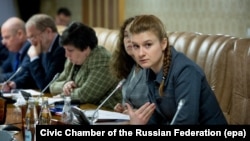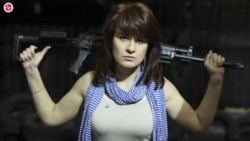The Russian citizen and gun rights advocate Maria Butina, who was convicted of conspiracy and acting under the direction of the Russian government, was released from U.S. federal prison on Friday, October 25.
In April 2019, Butina was sentenced to 18 months in prison for failing to register with the U.S. government as a foreign agent. She spent 15 months in jail following her arrest in July 2018.
At her sentencing, Polygraph.info’s William Echols reported Butina’s attorney called her a “sincere” gun rights advocate and a “straight ‘A’ student” at American University in Washington, DC. U.S. District Judge Tayna Chutkin said the U.S. was “the primary target of malign Russian actions” and Butina’s efforts for the Russian government were “sophisticated.”
Since her arrest, Russian government officials have sought to minimize Butina’s role.
Video fact check by Nik Yarst
Polygraph.info has fact checked a number of those statements. Below are links to our fact checks. Click on the headlines to read them:
Friday's fact check:
Russian Official Claims Butina 'Returning Home' Thanks to Advocacy, not Plea Deal
By William Echols
A Russian official claims Maria Butina is being “returned home” as a result of public and government pressure. However, the convicted foreign agent’s release lines up with the conditions of her plea deal.
Earlier in 2019:
Russian Lawmakers Claim Butina Faced ‘Inhumane Conditions’
By William Echols
After Maria Butina's sentencing, Russian deputies are threatening to draft a list of U.S. nationals that Russia claims have violated its citizens' rights. Yet, while Russia claims Butina faced “inhumane conditions” behind bars, her experience in the U.S. justice system appears to have been routine.
Facts do not Fit Russian Accusation That U.S. Holds ‘Hostages’
None of the Russian people Kiselyov names are “hostages.” One was convicted in court, another pleaded guilty, and one has not even been arrested. Reasonable protests have been made in the fourth case, but there have been no demands from the U.S. as terms for release.
Video fact check by Nik Yarst
2018 fact checks:
Russian Embassy in Canada Uses Butina Case to Attack #MeToo and Feminism
By William Echols
The Russian Embassy in Canada has tried to tie the conspiracy case of Maria Butina to the Me Too movement against sexual harassment and assault. The embassy said her conviction shows the “bias and hypocritical” nature of Western feminism. But Butina’s prosecution has no link to #metoo or feminism.
Breaking Butina? Lavrov Says Plea Squeezed Out of Confessed Russian Agent
By William Echols
While a debate rages within the U.S. regarding the country’s plea bargaining system and the use of solitary confinement, there is no evidence that Maria Butina was faced with circumstances that deviate from current norms in the U.S. criminal justice system.
Russian Agent Butina Set for US Citizenship, Journalist Claims Without Evidence
By William Echols
With a new court filing alluding to a possible plea deal, a Russian journalist has claimed without evidence that indicted Russian agent Maria Butina will be granted U.S. citizenship after being tortured in prison. But Butina’s solitary confinement does raise troubling questions.
Putin on Butina: Our Poor Innocent Girl, Who None of Us Know
By Fatima Tlis
Vladimir Putin’s claims are false: Maria Butina is reportedly known in Russian intelligence circles and the country’s Foreign Ministry has demonstrated uncharacteristic interest in her fate. In pleading guilty, Butina said she was acting voluntarily and with no coercion.
Despite Russian Claim, Maria Butina Was More than a Mere Student
By Fatima Tlis
Maria Butina worked as a “special assistant” to Alexander Torshin, a former Russian legislator and central bank official. For two years, she not only attended classes but engaged in a systematic effort to promote Russia among Americans involved in politics.
Maria Butina's Own Words Belie Claim That Charges Are 'Trumped up'
In ruling that pretrial detention for Maria Butina was appropriate, the court found the “weight of the evidence” against her was “substantial.” Guilt cannot be established without a guilty plea or verdict at trial.







